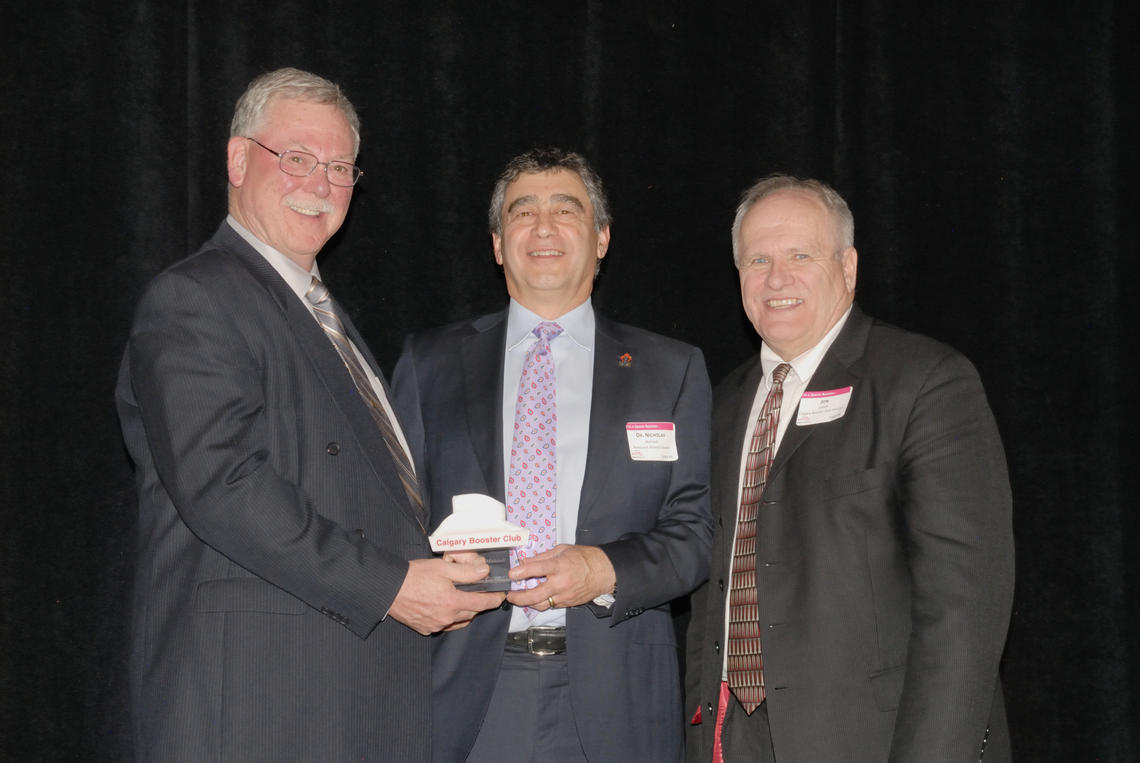April 18, 2018
Calgary Booster Club honours Kinesiology's Nick Mohtadi

Nick Mohtadi, centre, receives an award from Calgary Booster Club’s Al Taylor, right, and Jon Jewell
Mike Retallick
When broken athletes are put back together, they tend to be appreciative.
So on a bookshelf in Dr. Nick Mohtadi's office at the University of Calgary's Sport Medicine Centre is an autographed photo from a thankful rugby player whose ruptured hamstrings had been repaired. Somewhere else is a National Finals Rodeo belt buckle, the keepsake happily handed over by a cowboy who'd benefited from Mohtadi's surgical expertise.
"That means a lot when people remember you from things," says Mohtadi. "The things that really make the difference is this sort of stuff — when an individual thanks you for fixing them."
Sometimes the display of gratitude is simple — a heartfelt acknowledgement, which is what Mohtadi received shortly after the Calgary Dinos' triumph in the 1995 Vanier Cup at the SkyDome.
One of the regulars, in the weeks leading up to the Canadian university football championship, had wrenched his knee.
"He was devastated," recalls Mohtadi. "He didn't need surgery, but I said, 'If we make it to the Vanier Cup, you're going to be there and you're going to play.' At the time, that didn't seem to be possible. But he did (return) and we won. After the game, he was in tears because he thought his season was done and here he is making a difference in the biggest game of his life. He thanked me for the care."
These private moments resonate for Mohtadi, who's spent his professional life as an orthopedic surgeon treating athletes — of all levels, in all sports.
His contributions have not gone unnoticed.
Mohtadi has been named one of the 2018 Honoured Athletic Leaders by the Calgary Booster Club, which toasted the gentleman at the 65th Sports Gala on April 15. The 60-year-old admits that public recognition feels good. "This basically acknowledges all the stuff that you do on the side that nobody really pays much attention to."
Mohtadi's scope is broad. He's lent his expertise to Canadian contingents at the Olympics and Pan-Am Games, in addition to serving as the Calgary Flames' team surgeon for 20 years. He has been on the sidelines for the Dinos football team for 27 straight years. Not stopping there, he's worked with — and on — competitors from every sport imaginable.
All of which makes him a better surgeon. It informs his handiwork. For example, falling on your arm can dislocate your shoulder. But for rodeo competitors, that particular damage can occur in more ways than one.
"You can have your shoulder ripped out because you're still holding on and you're getting bucked in the other direction. You can get caught on the rope and get it ripped out. Or you can have a bull kick your shoulder out of place," Mohtadi says. "Well, how do you explain that to an orthopedic surgeon that lives in England or Saudi Arabia and has never seen rodeo?
"The vast array of injuries that you experience — and the nuances of those injuries — gives you a much greater appreciation of what you do as a surgeon."
As a youngster, Mohtadi lettered in four sports in high school while also becoming the Canadian Junior Tennis Champion. He put together a remarkable stretch in tennis — going to Oklahoma City University on an athletic scholarship, was the Canada Games gold medallist in 1977, and won a bronze medal at the World University (FISU) games in 1979 while at medical school. After graduating from UCalgary in medicine in 1981, he played a year on the pro tennis circuit, qualifying for Wimbledon in men's doubles in 1982.
"My claim to fame is that I made it to the second week of Wimbledon," says Mohtadi, chuckling before adding the punchline. "Because it rained every day of the first week."
Hanging up his racket and interning in Victoria, he discovered that orthopedics suited him. So, too, did linking it to his love of athletics.
He's been part of the Faculty of Kinesiology's Sport Medicine Centre for 28 years, the last three as its director, which hasn't slowed his desire to expand his horizons, to help athletes of all stripes. The Sport Medicine Centre is recognized worldwide for its contributions in sport medicine.
"It's fun — it's the fabric of what I do," says Mohtadi. "It's mostly volunteer work, but it's integral to what I do. If I'm taking care of an athlete and I don't understand the sport, then how do you relate to that person? How do they relate to you?
"By being on the sidelines, at the rinks, at the events, you gain a whole different appreciation for that, which helps me in my practice immensely."
